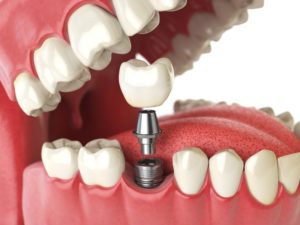
The more you learn about dental implants, the more you are going to want them to be the long-term solution for your missing teeth. Nothing against your dentures; they’ve helped you out for the last several years.
But you’ve done some research and you are getting ready to make a move. Keep reading to learn why you should transition from dentures in Sachse, what is required to be a candidate for dental implants, and what you should know to feel certain about your decision.
How Do I Know If I Should Switch to Dental Implants?
Receiving some encouragement about the change should be comforting. Dental implants will not slip around in your mouth or feel like they may fall out at any moment. Food won’t get trapped in your implants and no more dealing with sore gums or raw spots.
Feel free to eat all the foods you like – even the ones that are difficult to bite into or have little seeds. Clean your implants like natural teeth, no more bothering with denture adhesive or soaking them in a glass of water.
Dentures are certainly much better than having no teeth, but now you are taking a step up. Get ready to feel like you have permanent teeth again.
What Is Crucial to Be a Candidate for Dental Implants?
One key aspect your dentist will investigate at the consultation is the density of your jawbone. When your teeth are removed from your gums and jaw and are not replaced with anything, your jawbone begins to shrink. It can change the shape of your face, but also make getting dental implants a longer process.
You won’t have a successful implant procedure if you don’t have enough bone, so the dentist will determine if a bone graft is necessary. If so, you’ll need 4-6 months of recovery for the new bone to fuse to your current bone in advance of the implant procedure.
Before Committing to Getting Dental Implants, What Should I Know?
Getting the implants will require minor oral surgery. Once the implants have been placed, you will need to stay on a soft foods diet temporarily to let them heal. This usually takes 3-6 months while the bone grows to fuse the implant screws to your jawbone.
It will be essential during this time to avoid placing excess strain on the implants, so they do not shift or heal crooked. When they have successfully fused to the jawbone, your dentist will clear you to return to your normal diet.
As far as day-to-day care, you’ll return to the regimen you used when you had natural teeth with brushing and flossing. When flossing, it will be important to clean around the areas where each dental crown and implant connect.
You’re sure to have some unanswered questions, but that’s part of what the consultation with your dentist is for. Just keep the big picture in mind – the surgery and recovery in the short term will pay off when you transition to the best alternative to natural teeth for many years to come with dental implants in Sachse.
About the Author
Dr. Travis Rottman has appreciated the opportunity to spend the past decade working to create relationships with his patients based on trust and respect. He strives to provide optimal dental care to patients of all ages in Sachse, Wylie, Murphy, and surrounding communities. Dr. Rottman earned his Doctor of Dental Surgery from Texas A&M Baylor College of Dentistry. He maintains membership in the Academy of General Dentistry. If you are considering the transition to dental implants, know that Dr. Rottman works with local specialists to ensure you get a lasting solution for any number of missing teeth and multiple financing options are available. To take your first step in the process, you can schedule a consultation on his website or call (972) 848-0073.
